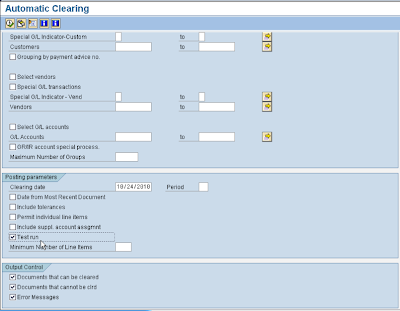Bank Accounting
1) Bank Master can be created four ways :
i) When entering Customer/Vendor master records or in the customizing for house banks.
ii) Using the create bank transaction in the accounts payable/receivable master data menu.
The bank directory can be imported from disk/tape using program RFBVALL_O.
Customers using lock box function can create a batch input session that automatically updates customer banking information in the master records.
2) Bank key contains - Bank Master data contains Bank name, Region (State), Address
3) Bank key is assigned to a house bank.
4) GL a/c code is assigned to the house bank along with Account id.
5) Steps to create – House bank
i) Create bank master with bank key (E.g. – 01)
ii) Create House bank (E.g. – ICICI) – Enter House bank id, Country, Bank key, Contact person + telephone numbers.
iii) Create bank a/c – Enter House bank id already created (It will take bank address from already assigned bank key to that house bank id), Bank id (E.g. SB), Description (E.g.-Savings bank a/c), Bank a/c no, Currency, G/L a/c.
iv) Change G/L a/c – in tab -create/bank/interest, enter house bank id and Account id.
Summary
(a) Create -Bank key,
(b) Create house bank id and add bank key.
(c) Create bank a/c with Account id and assign GL a/c.
(d) Modify G/L a/c and assign House bank+Account id.
6) For every bank a/c G/L account must be created. This G/L account is assigned to the bank a/c and vice versa. Both accounts have to have the same account currency.
7) In the Customer/Vendor master record, the field “Bank Type” is used to distinguish between different banks.
8) Using the house bank id and the bank types the payment program determines the banks to be used.
9) Each bank a/c is reflected in the SAP system by a combination of house bank ID and account ID (bank type).
10) The bank group is used for classifying banks. The key is freely assignable. The aim of classification is to group banks together in such a way that payment transactions within a group can be carried out as fast as possible (payment optimization).
11) The SWIFT code is used for identifying banks in international payment transactions.
12) Every bank master record is identified by the bank country and bank key.



Comments
Post a Comment